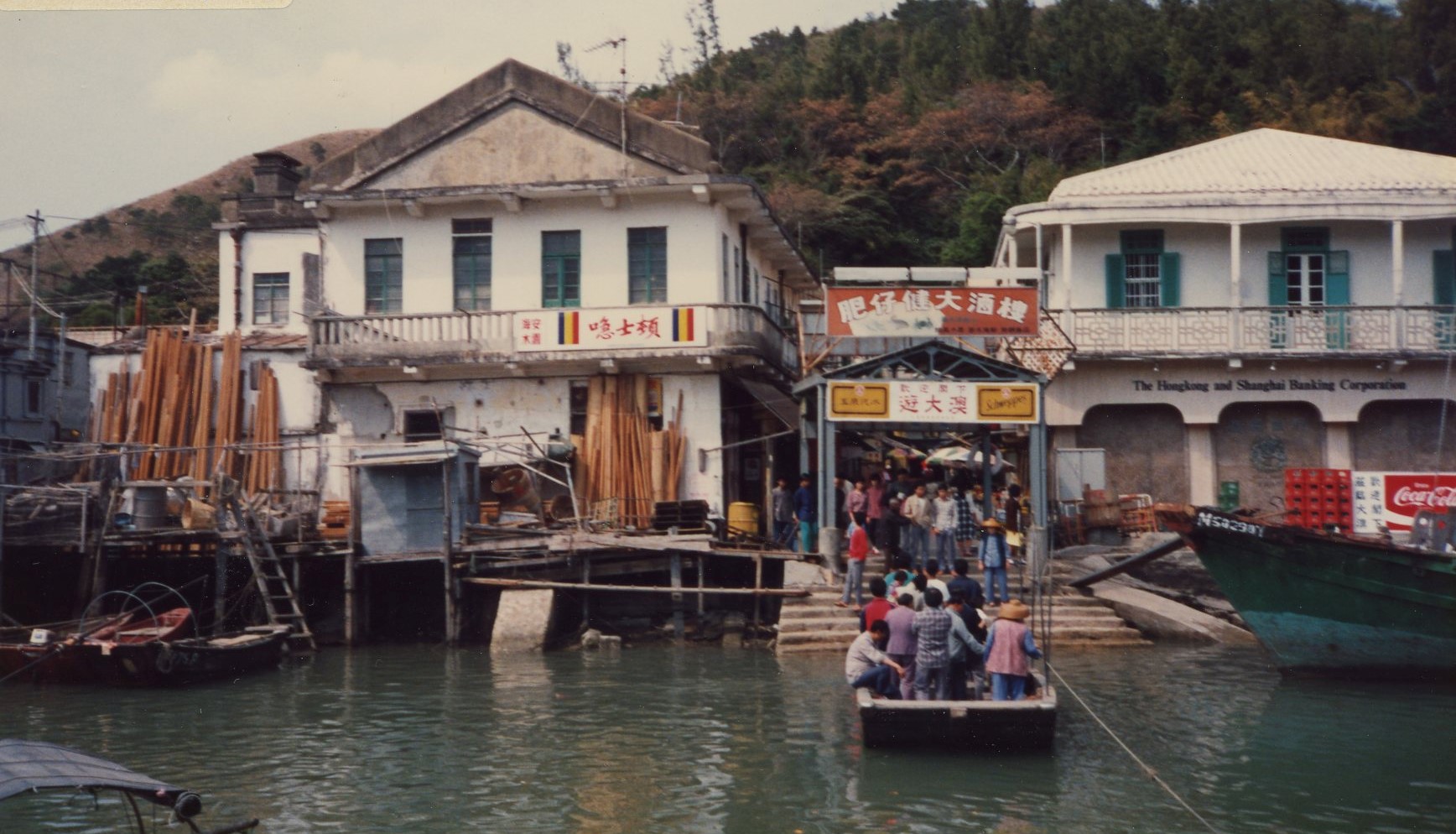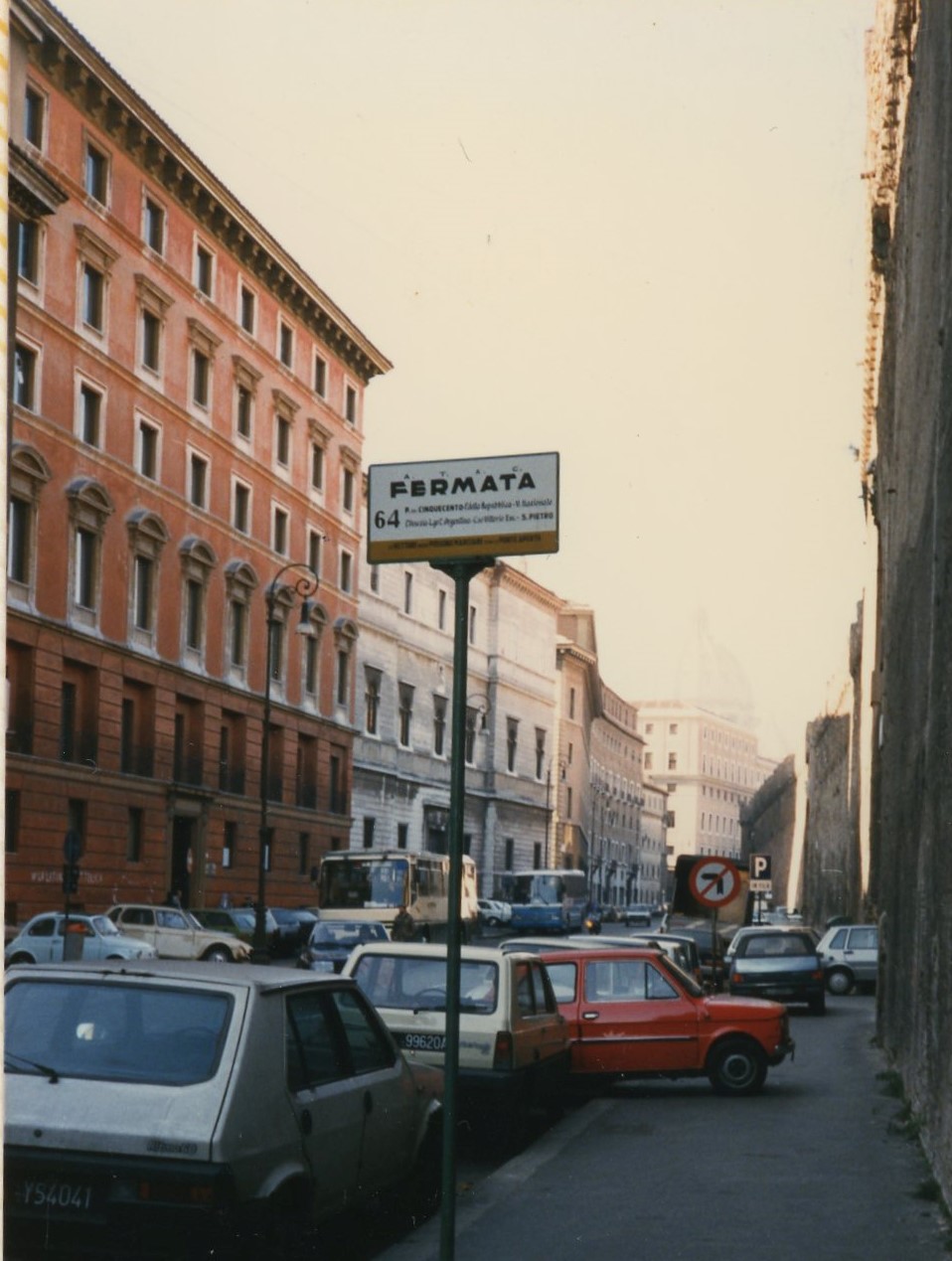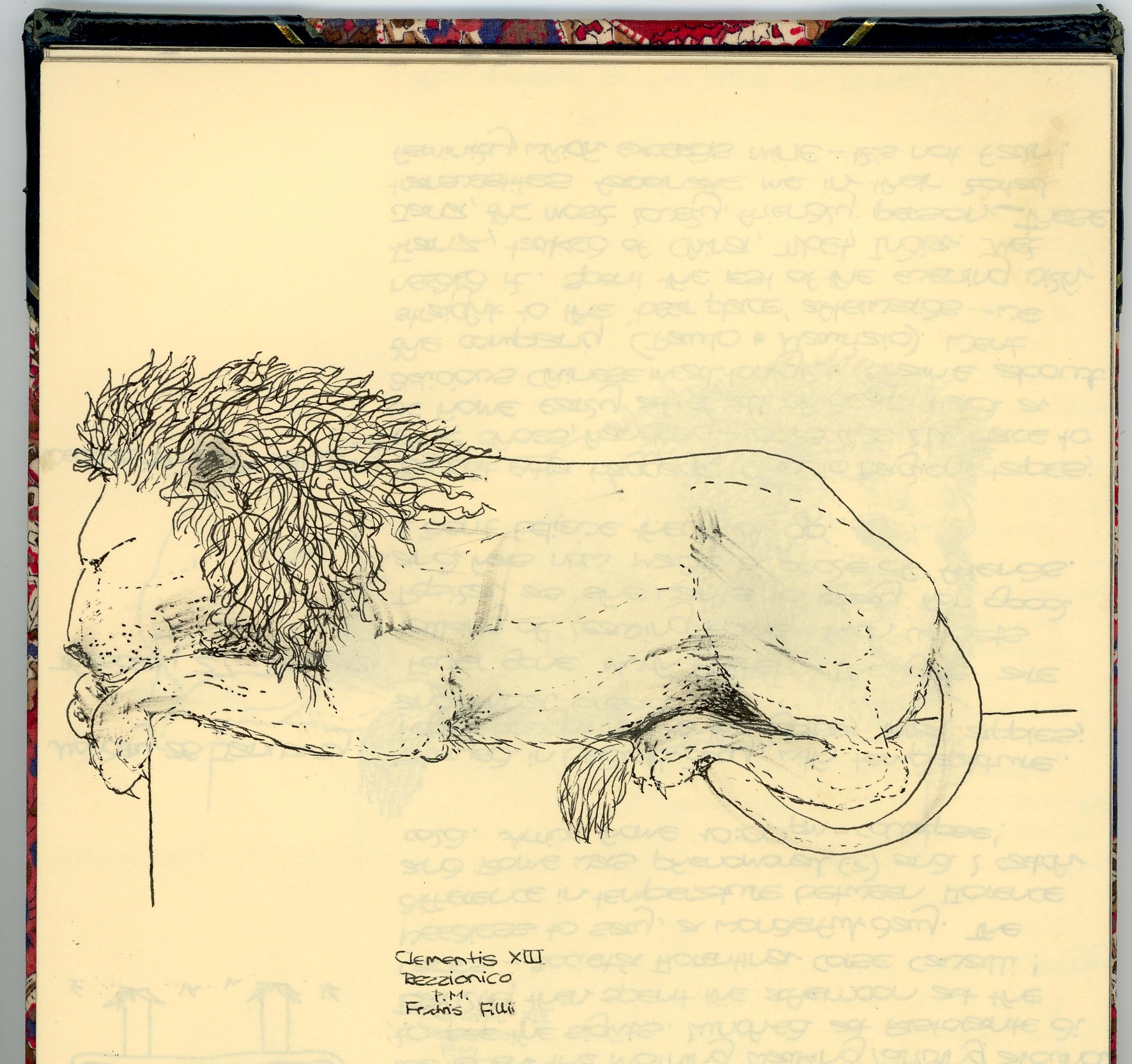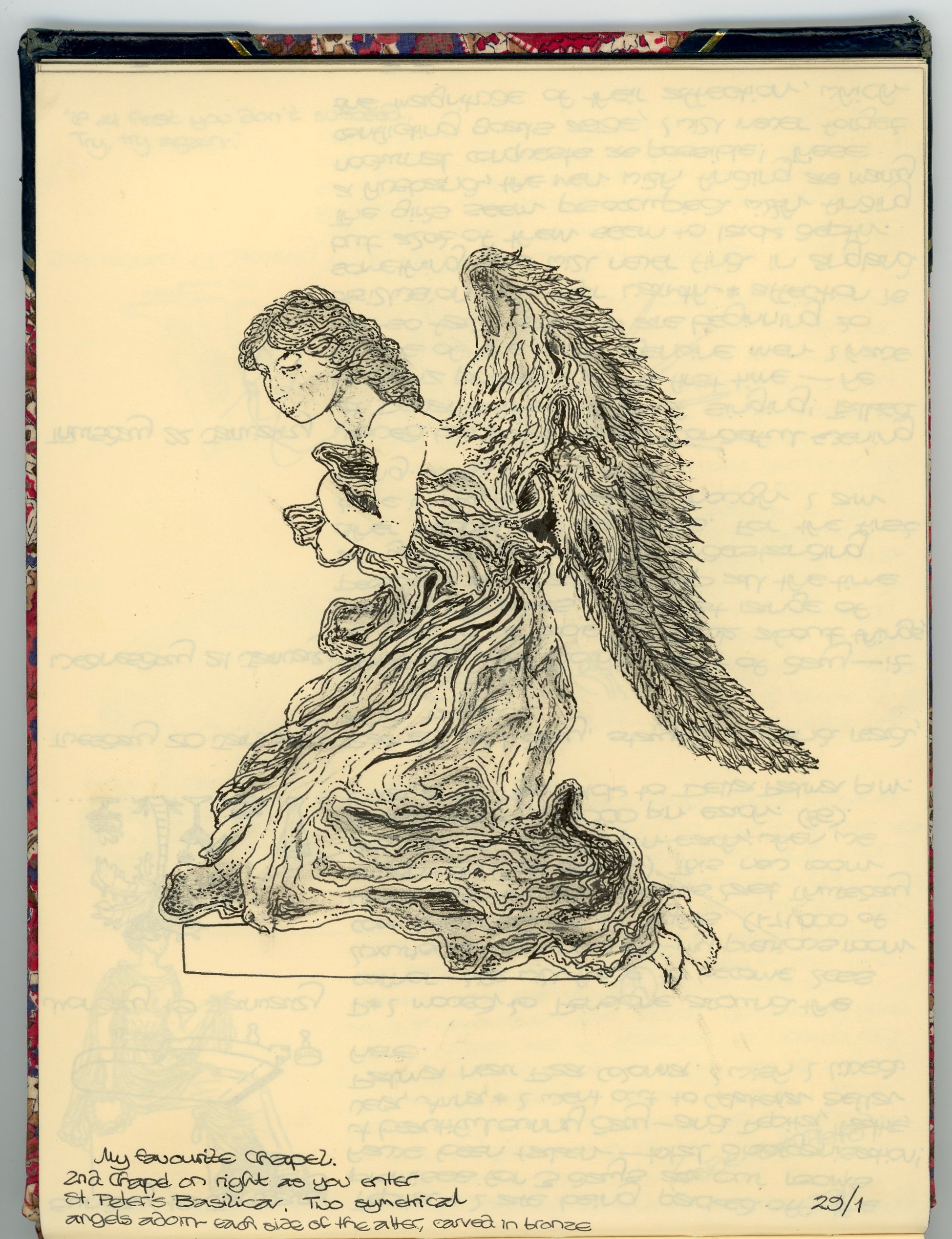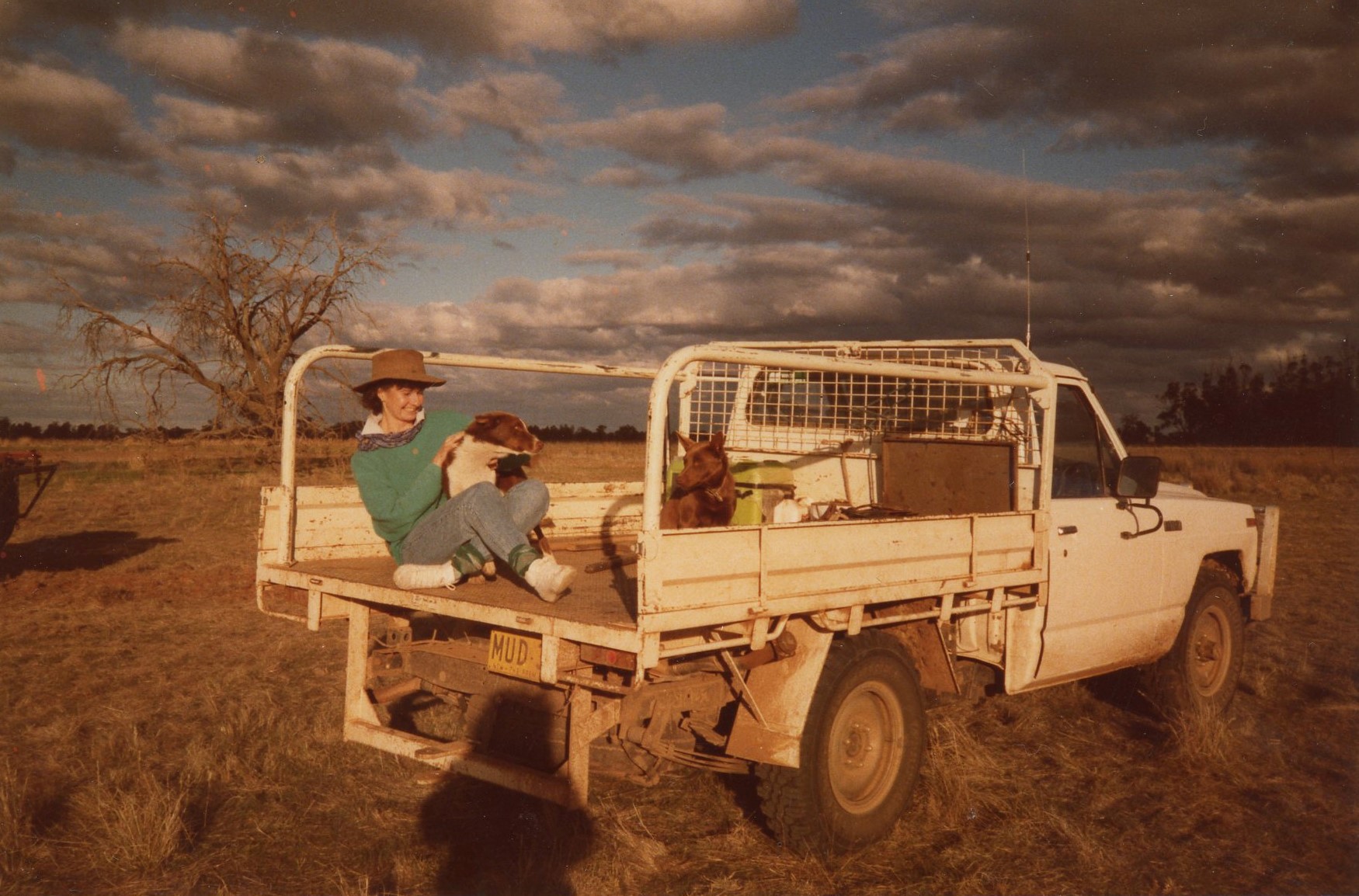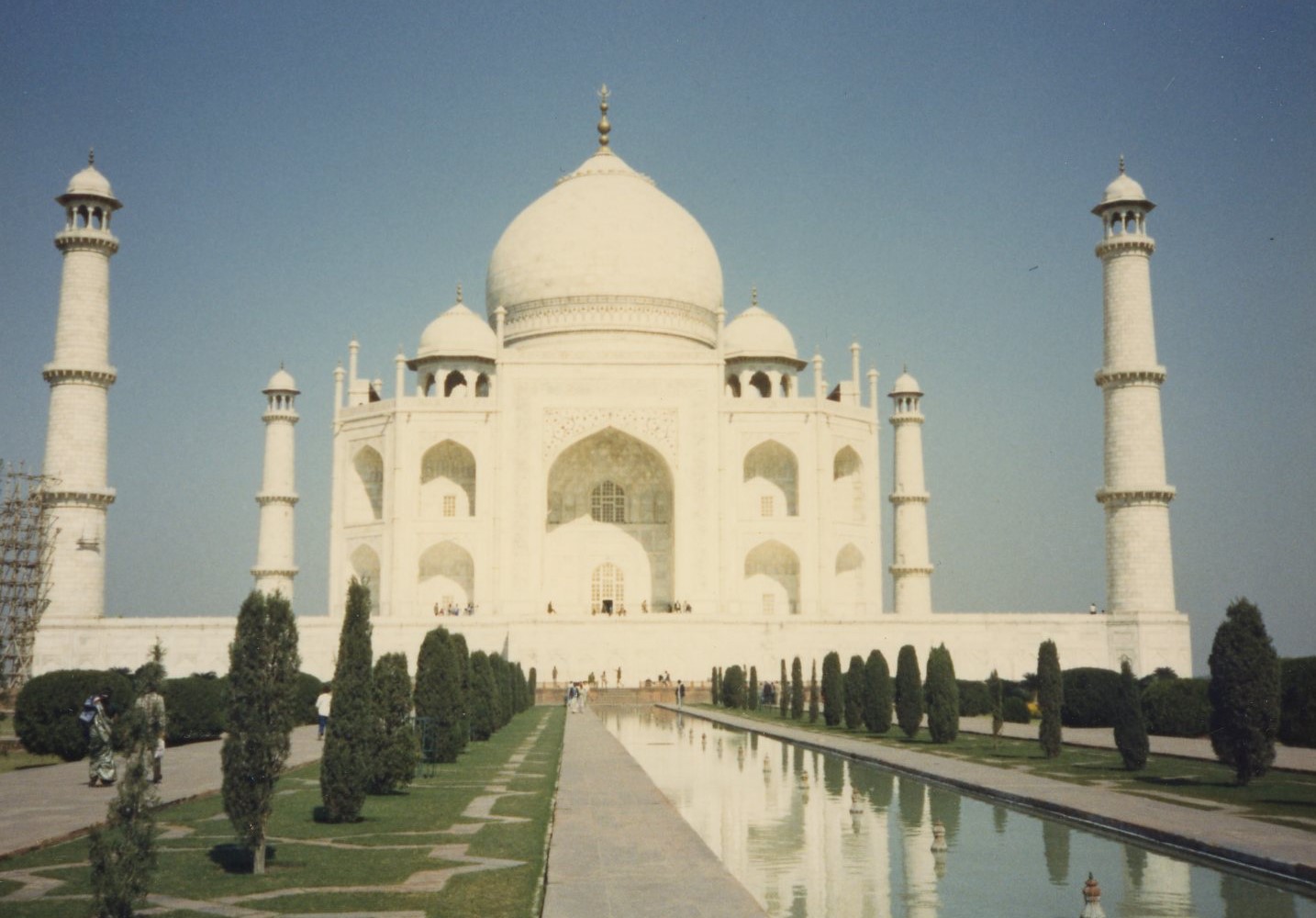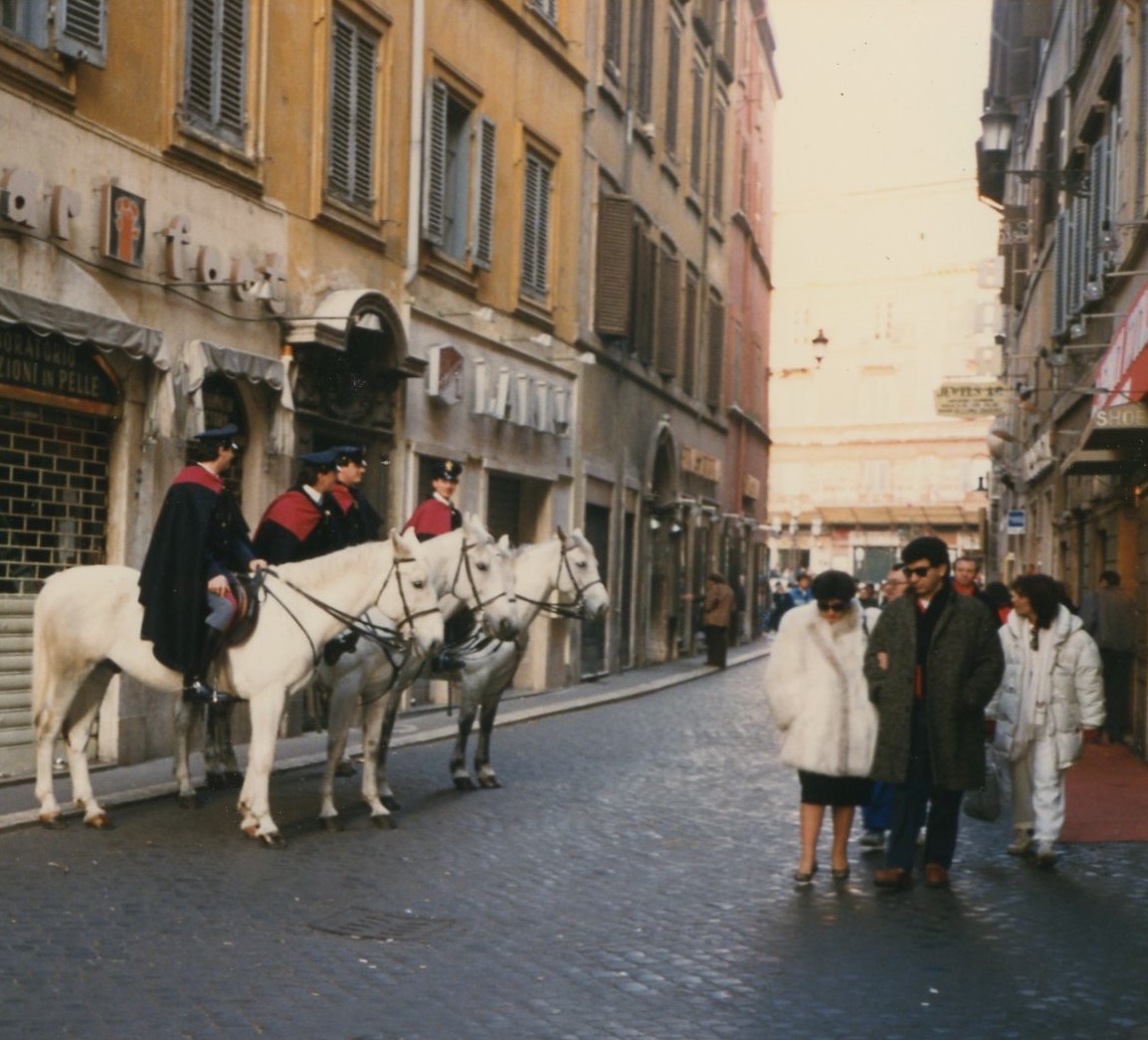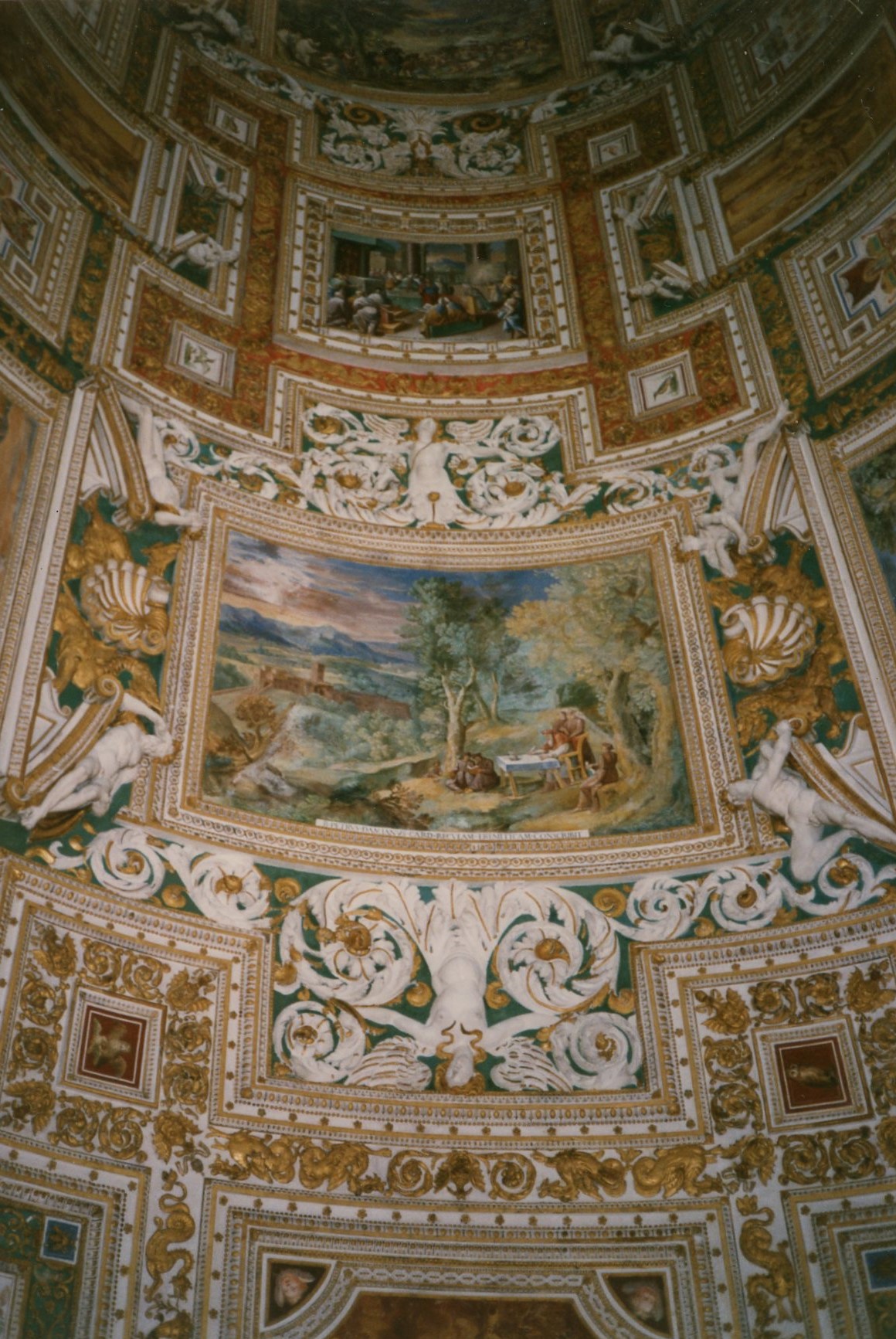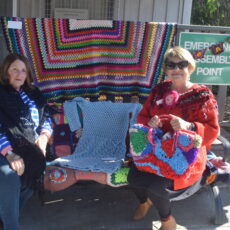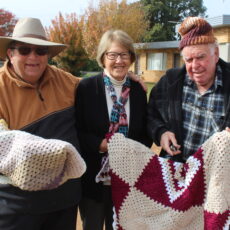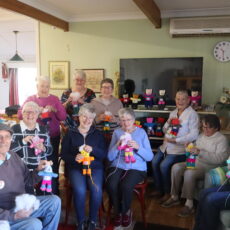When a friend handed me two beautifully bound notebooks with the words “A present for you, to document your journey”, my initial reaction was that I will never be able to fill these two books up!
I was about to embark on a solo journey, travelling the world with a round the world air ticket.
The only stipulation was to traverse the route in one direction only with a time limit of 12 months.
To the disbelief of some, I was selling my flat, leaving my job of 11 years as PA to a director of an insurance company in London, and to boot, travelling alone.
With trepidation I landed at my first destination, Rome, and jumped on an airport shuttle to the central terminal (Statione Termini), armed with no more than my luggage and the name ‘Pensione Piave’, a low-budget bed and breakfast I had pre-booked In London, embedded in my mind.
No mobile phone, no Google maps, no Google, no language abilities.
It took me five hours to find it.
I did not know at that point, that my stay at ‘Mama and Papa Piave’s’ (as we later affectionally called them) with other like-minded travellers would be the beginning of an adventure of a lifetime.
And from that point on things improved.
I got wiser, I explored local sights and dove, mentally and physically, into the experience.
And the two books? They were filled – with diary entries, pen and ink drawings, and as I left each destination, a summary of how I felt about each country.
ROME January 5 – February 2, 1987
My memories of Rome will always be aimlessly wandering down her streets in the crisp, bright January weather.
To walk in haste would be to miss so much.
The piles of little battered cars parked up as if their owners had left them in panic, haphazardly like children’s toys.
The presence of the local carabinieri, cruising in their jeeps.
The keen eyes on the lookout for a potential picked pocket or bag.
The gypsy children, who act a charade of blindness or show you a newspaper to accomplish this feat.
The madness of the traffic, tearing in and out of side streets, hooting incessantly when kept waiting for more than a couple of seconds, the noise of which would gradually increase and travel along the line of cars to reach an orchestral crescendo.
The hot Italian tempers that would flare at the slightest error – their vehicles left running while a loud, gesticulating argument ensues in the middle of the road.
Conversely, it is also not unusual to hear the smack of metal upon metal, whereupon the drivers would then simply proceed along their way.
Mistrust runs so high in this city.
It is a common sight to see the men carrying the radio or cassette equipment from their cars around with them.
There is an endless fascination in watching a living environment so different from one’s own.
Budget restrictions meant eating dinner in many of the cheap little Italian cafes scattered around the city or having a quick cappuccino at one of the stand-up coffee bars situated on almost every street corner.
The food is delicious. It can cost as little as L8000 a head for a three-course meal at one of these little cafes (that would be A$6.50 today).
I love the piano bars, for the wonderful atmosphere, and the variation in what they sell, from gelato, cake and coffee to cocktails and champagne and tasting plates.
It is quite an achievement to catch a tram or a bus here.
They seem to stop for the briefest of seconds, then hurtle off regardless of an elderly lady who may have just stepped aboard.
It is fun to jump onto one of these buses and let it take you wherever, and enabling you to see the run-down and dubious areas without being in any danger yourself.
The ticket system leaves a lot to be desired, relying on a machine to ‘punch’ your ticket for you.
Needless to say, this machine does not reprimand the majority who seem to ignore it!
Running in between Via del Corso and the beautiful Spanish Steps at the Piazza di Spagna, are cobbled streets where every shop has exquisite clothes, shoes and jewellery.
I feel sure I will not see shops like these anywhere else in the world.
The ‘smart set’ wander up and down these streets, flaunting their stunning Italian good looks.
They frequent the upmarket coffee bars in this area, something else yet again, serving freshly cooked crepes, a magnitude of different flavoured ice creams, and more chocolates and sweetmeats than I have ever seen.
The beggars who amble along or huddle in doorways provide a sharp contrast to this scene.
A young tramp, maybe in his 30s, cuddles a puppy wrapped up in his coat.
Needless to say, this play on people’s emotions is successful, and his cap laid out on the pavement is constantly full.
It is glorious to wander down the many little backstreets and turn a corner to suddenly come across a beautiful piece of Rome’s architecture, a fountain, an historical building, or a quaint archway.
I would sit in different locations for hours on end, drawing the magnificent sculptures.
I feel the loneliest at night.
Sometimes I sit in my room and stare through the shutters of my window out at the street where the traffic is still bustling as late as long past midnight.
This is only the first month of my journey, and it seems as if I have lived a lifetime in Rome.
I think this may be because when one travels and experiences alone, visions and perceptions are so much more intense.
I feel as if I have seen so much, yet there is still so much more to see.
I feel that I will never be able to drink in all of it, there will always be some intricate aspect that will escape me.
When my spirits are low, I think of home and how nice it would be to be living once again in the security that comes with routine.
There are other times when my heart feels so full with this experience.
If I try to pinpoint a particular lone experience or sight which could have sparked it, I find I cannot.
NEW DELHI February 3 – 9, 1987
The horror that is India envelopes you and encompasses you; it stays with you no matter what sights of breathtaking beauty await you, no matter how courteous the Indian people’s manners are towards you.
The heat, the dust, the smells, the filth.
Hundreds upon hundreds of barefoot, dirt encrusted human beings live in mud and straw huts or contraptions assembled from bits of boarding, iron and plastic; their sole wealth cluttered inside and out.
The cattle (normally one to each family, sometimes two) hang their heads low in the heat, now and then a scrawny dog limps by.
A cow is a necessity to these families, for their milk and their manure.
Daily the drying dung is shaped into small round disks and laid out in the sun to bake hard.
They are then piled into neat little domes ready to be used as ‘firewood’ by the family or sold as fuel for others.
All cooking, washing and toiletries are carried out in the open outside these manmade hovels.
The women keep themselves completely covered at all times.
In contrast to these scenes, India is very spiritual.
The religions, Muslim or Hindu, extremely intense.
The monuments, temples, tombs and personal shrines are awe-inspiring, the effort and time spent on the jewels and the petals of real flowers, inside and out.
It is an image you want to return to again and again, to see it and wonder at it.
The City of Agra, reputedly the birthplace of Krishna, is legendarily one of the incarnations of God on earth by the Hindus.
It was this journey to Agra, which took about five hours, that showed me the most memorable scenes of desolation.
Since then, I have sometimes wanted to take photographs of these scenes, but I find I cannot.
Something holds me back. How can you stand three feet away from someone and take a picture of their misfortune?
They are still one of us, and we should respect their dignity and pride.
Excerpt from a letter to home from New Delhi …
Well, here I am, I cannot believe I am halfway across the world, looking at scenes which before now meant little more than a third-world documentary on the television.
India is a shock, there is no doubt about it.
Today I have stayed at my hotel, and I am now sitting in the garden (this must be an unusual thing to do, as they had to bring a chair out specially, and I am the only one out here, bar the old gardener, who has now fallen asleep in the bushes).
There is marigold, sunflowers, azaleas, even quite English-looking trees … it could be an English garden except for the two palm trees that flank the gateway, and the lizards who try to climb the hedge and scuttle away into the undergrowth.
It certainly feels far removed from the scenes which greet you if you walk not a hundred yards from here.
I went for a stroll on my first day here, which was not the most enjoyable walk of my life, and whilst I walked by the scenes of debris, I was struck by the beauty of a bright yellow parrot which suddenly flew upwards, out of the mess.
I am reminded of this because the birds in this garden are being very cheerfully noisy, but infuriatingly remaining out of sight!
The yellow parrot sums up India for me – you have great beauty, surrounded by great poverty.
Whilst seeing temples and monuments does of course afford momentary pleasure, I do not comprehend how anyone with any compassion whatsoever can say they actually ‘enjoyed’ seeing India.
For me it is a very emotional and moving few days.
I cannot say I am enjoying it; but at the same time, I wouldn’t trade places with anyone else in the world.
HONG KONG and CHINA February 10 – March 30, 1987
Hong Kong is a spectacle.
Photographs cannot convey the physical impact you feel when confronted with this scene for the first time.
It is a stunning sight, particularly to touch down by plane, and it is something the people of Hong Kong are very proud of.
To explore is another matter altogether.
I think it is best to do this as widely as possible, to embrace as many different aspects of the mainland and islands as you can.
Hong Kong seems completely geared towards making money and spending it.
The business world reigns, closely followed by the consumer market, all conducted in skyscraper neon-lit towers linked by walkways, escalators, and elevators so fast and smooth that you are on the 34th floor before you even sense that you were in motion.
Life for the middle-upper classes is good, if you are prepared to work hard.
Anything you could possibly want can be ordered, manufactured, and bought in Hong Kong, with a pervasive, perpetual buzz of hyperactivity.
But my fondest memories are of the outlying islands where life is very much simpler, and the people who live there seem so content.
Then there are the boat people, referred to in Chinese terms as ‘drifting wood’.
These people have neither Chinese or Hong Kong citizenship and by law must stay off the land.
Consequently, some live their entire lives on these boats moored to the shoreline.
Life for the lower classes in Hong Kong means they are often residing in skyscraper flats which are so small, there are some rooms being rented out of a size only big enough to fit a bed.
To walk among the backstreets and see how they live, in the grubby tatty tower blocks next door to their wealthier counterparts, it is a reminder of so many inequalities that exist throughout the world.
There is one thing that exceeds your fascination with China and its people, and that is their fascination with you.
Wandering through their streets and markets, there is a sharp contrast between those who seem to ignore you (which is quite common) and others who like to touch you, yattering about your clothes, offering you a handful of nuts and showing you how to crack them open with your teeth – followed by bursts of appreciation and laughter when you succeed.
Tiny children everywhere call out to you to say hello.
The miles upon miles of farmland are a wonderful sight.
Rice fields, sugar cane fields, and huge sprawling fields of banana trees.
Endless stretches of irrigation channels bordering each field with adjoining containment ponds.
The farmers tramp barefoot and bedecked with quaint straw hats through these sodden squares with their water bison, carrying out each labourious task by hand.
Scattered around here and there are little thatched huts, no doubt as meagre an accommodation as India’s mud and tin, just externally more pleasing to the eye.
China’s towns and cities bustle with hundreds of bicycles, and the rush hour is a frantic and amusing sight.
The bicycles have precedence over all other vehicles, and the manoeuvring abilities a mixture of skill and luck, particularly at crossroads.
The markets are also a hive or activity, but it is somewhat disconcerting to be confronted with the varieties of edible meat – rat, dog, cat, mule being just a few.
The Peoples Republic of China. Well, they seem happy enough.
Primary education is compulsory and secondary education is optional, depending on whether the family can afford it or not.
If the government considers that a family qualifies, university education is financed by the communist party.
The consequence of this is there is government control in decisions about prospective professions and locations of work, which could be anywhere in China, miles away from family and friends.
Arranged marriages are now against the law, but restrictions are still in place, such as the girl must be at least 20, the boy at least 22, and they are bound by law to apply for their accommodation to the government, to whom they will be paying rent for the rest of their lives.
Only one child is currently permitted.
The lack of freedom of choice outweighs the few good points about this country.
The crime rate is touted as the lowest in the world, and capital punishment (execution by firing squad) is served for murder and rape.
This seems to be the obvious deterrent as opposed to the emotive stability of China’s population.
One achievement worthy of note is that unlike India or Hong Kong, national poverty seems to be under control.
The police and army are continually patrolling everywhere I go, creating an aura of ultimate control and discipline, and quite unpleasantly so.
Passports must be shown at border controls.
To have traversed a country such as this is quite a humbling experience, and I don’t think there can be a clearer way of showing us how fortunate we are.
Back in Hong Kong, I decided to visit Tai O, a little fishing market town located on the western side of Lantau Island.
A bus dropped me off, with no one else disembarking with me, at the Tai O Road junction, where I had to wait for a connecting bus to take me down to the village.
It was a little disconcerting to be standing alone, three-quarters of the way up a hillside, in very remote territory, waiting for a bus which I had absolutely no idea whether it was going to arrive or not.
It came along eventually, and took me down to the village of Tai O.
It was wonderful to be back among the simpleness and reality that poverty, for some reason, seems to place before you.
I love to wander around the streets, to have no idea of my bearings, just so that I may listen, watch, and feel everything that is going on around me.
I see how these people live, they seem so happy, and this transmits to me and makes me too, feel at peace.
Tai O is broken in two by a narrow river running through the centre, creating one half of the village to be a tiny island.
There is a crude raft which crosses back and forth, which cost HK 0.20 cents to stand on and get across to the other side.
A wizened (but very fit) Chinese woman literally pulls a rope to propel those on board across the narrow divide, via a rope strung from the mainland to the island.
I loved walking through this ‘broken off’ piece of land.
The families live in shanties, many on stilts above the tides, and all of them small and cramped. (It was interesting to note that most had TV aerials though!).
The children run and play around the outlying mudflats and there is an aura of contentment.
Every now and then you come across a shrine carefully laid out in front of a shanty, each one dedicated to various gods, an elaborate altar of red, yellow and gold with joss sticks burning and offerings of fruit and flowers.
Three little children were playing in the mudflats around by the south side of the island, playing with nothing in particular that I could see.
They waved to me and called out a greeting as I walked by.
As I walked on by the shoreline, they called out to me again and started running to catch up with me.
Expecting them to be asking me for money or some such thing, reminiscent of the children begging in Rome, I turned towards them.
Imagine the immense warmth and surprise flooding through me when I realised this could not be further from the truth.
As I turned, the little boy handed me a beautiful purple flower. I shall always treasure it.
After leaving Hong Kong and China, I caught a flight to Melbourne and spent the next four months catching a tram to work in an insurance broker’s office.
This revived my dwindling funds.
I met and became friends with many wonderful Australians, and it felt like home to me.
From there I visited Sydney and later backpacked up the eastern coastline of Australia and into central Queensland.
It was along this coastline I met my future husband.
At the end of the year’s travels, I headed home to England for 10 months and together with my husband, returned to make Australia my new family home.


